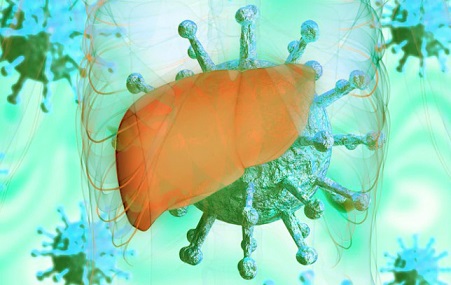Nikhil Prasad Fact checked by:Thailand Medical News Team Oct 02, 2024 6 months, 1 week, 4 days, 11 hours, 29 minutes ago
Medical News: In a recent retrospective study from Tianjin First Central Hospital-China, researchers discovered a significant relationship between mild or asymptomatic Omicron variant infections and changes in liver enzyme markers. The findings show that even people who don’t show strong symptoms of COVID-19 can still experience liver stress, a new area of concern for public health. This
Medical News report delves into how these liver function changes were detected and what they mean for our understanding of Omicron infections.
 Medical-News-Liver-Stress-Detected-in-Mild-and-Asymptomatic-Omicron-Cases
Key Study Details
Medical-News-Liver-Stress-Detected-in-Mild-and-Asymptomatic-Omicron-Cases
Key Study Details
The study, which was led by Dr Xi Cao, Dr Yong-Li Xie, and their colleagues from several prominent institutions, explored liver enzyme variations in 1,133 patients with mild or asymptomatic Omicron infections. The institutions include Tianjin First Central Hospital, Tianjin Stomatological Hospital, Nankai University, and the Third Central Hospital in Tianjin, China. The research team analyzed data on liver enzyme levels, demographic information, and inflammatory markers to understand the impact of Omicron infections on liver health.
The study examined patients who had no previous liver or other significant underlying conditions. By focusing on relatively healthy individuals, the researchers could isolate the effects of Omicron infection on liver function.
What the Study Found
The study showed that 27.7% of the patients had abnormal liver function tests, with men being more affected than women. These findings bring to light the possibility of liver injury in individuals who do not show severe respiratory symptoms, which was traditionally the focus of COVID-19 studies.
Researchers grouped the affected patients into three categories based on the type of liver enzyme abnormalities they experienced:
-Hepatocellular Type: This type, observed in 4.94% of patients, involved elevated levels of enzymes like alanine aminotransferase (ALT) and aspartate aminotransferase (AST), which are key indicators of liver cell damage.
-Cholestatic Type: A more common finding, seen in 16.33% of patients, was marked by elevated levels of alkaline phosphatase (ALP) and gamma-glutamyl transferase (GGT), enzymes that reflect bile duct issues.
-Mixed Type: In 6.44% of the cases, patients showed a combination of both hepatocellular and cholestatic abnormalities, indicating broader liver stress.
Gender and Age Play a Role
The data showed that males were significantly more likely to develop abnormal liver enzyme levels compared to females. One possible explanation is that men may have a higher expression of ACE2 receptors, which the SARS-CoV-2 virus uses to enter cells. This could make their liver cells more vulnerable to the effects of the virus.
In addition, older patients were more likely to exper
ience liver enzyme changes. The study found that as age increased, so did the likelihood of developing cholestatic liver injury. Age and gender combined created a higher risk profile for abnormal liver enzymes, which could help doctors focus on monitoring these patients more closely.
Link Between Inflammation and Liver Stress
Another crucial finding was the association between liver enzyme abnormalities and increased levels of inflammatory markers. Patients with abnormal liver enzyme levels showed higher levels of procalcitonin (PCT), interleukin-6 (IL-6), and C-reactive protein (CRP). These markers are commonly elevated in the body’s response to inflammation and infection.
Patients with abnormal liver enzyme levels also had lower levels of immunoglobulin G (IgG), which plays a vital role in immune defense. This suggests that a weakened immune response may contribute to liver stress in these patients. The study also found that the cholestatic group had the highest levels of IL-6, while those in the hepatocellular group showed a significant increase in CRP levels.
What Do These Findings Mean?
The research suggests that Omicron infections can cause liver stress even in patients who do not have severe symptoms. In many cases, patients with abnormal liver enzyme levels do not have pre-existing liver conditions, indicating that the infection itself could be causing these changes. This challenges the previous assumption that liver damage in COVID-19 was primarily seen in more severe cases.
Although the study found a significant number of patients with abnormal liver enzyme levels, the good news is that these changes appeared to be mild and did not lead to severe liver damage. Most patients recovered without any long-term effects on liver function. However, the findings highlight the need for further studies to explore the long-term implications of these liver enzyme changes.
How Doctors Can Use This Information
These findings provide valuable insights for doctors treating COVID-19 patients. Monitoring liver enzyme levels in even mild or asymptomatic cases could help detect early signs of liver stress. Early intervention might prevent more serious complications later on.
Doctors should pay close attention to older patients and men, who appear to be at higher risk of developing liver enzyme abnormalities. Additionally, keeping an eye on inflammatory markers like CRP and IL-6 can offer clues about whether a patient’s liver is under stress due to the infection.
Conclusion
This study provides a deeper understanding of how even mild or asymptomatic Omicron infections can impact liver function. Although the liver enzyme changes were generally mild, the findings highlight the importance of monitoring these patients more closely, particularly in males and older individuals.
The researchers concluded that Omicron infections could cause subclinical liver damage through a variety of mechanisms, including the body’s immune response and direct viral effects on liver cells. The combination of age, gender, and inflammatory markers should guide doctors in assessing the risk of liver stress in COVID-19 patients.
While the study focused on early-stage liver stress, more research is needed to determine the long-term effects of these liver enzyme changes. The team also called for additional studies to explore the specific pathways through which Omicron infections affect the liver, especially in mild and asymptomatic cases.
The study findings were published in the peer-reviewed Journal of Inflammation Research.
https://www.tandfonline.com/doi/full/10.2147/JIR.S478812
For the latest COVID-19 News, keep on logging to Thailand
Medical News.
Read Also:
https://www.thailandmedical.news/news/study-reveals-that-covid-19-is-causing-the-new-onset-of-acute-and-chronic-liver-disease-in-many
https://www.thailandmedical.news/news/breaking-covid-19-news-sars-cov-2-that-causes-liver-impairment-in-many-also-cause-hypoalbuminemia
